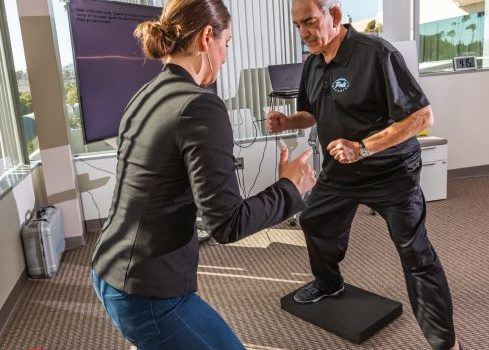

CogFit Program at PNI Featured in Kinesiology Today
by Guest Author
Our very own, Lesley Bell, Lead CogFit Instructor and Brain Health Coach at the Pacific Neuroscience Institute in Santa Monica, California was featured in the Fall 2019 edition of Kinesiology Today published by American Kinesiology Association.
The article discusses the connection between physical exercise and cognitive health as well as the goals of the CogFit Program (Cognitive Fitness) at the Pacific Brain Health Center.
Read The Full Brain Health Coach Article Below:
As a kinesiology student at the University of North Texas, Lesley Bell learned a lot about muscle atrophy – but she never took a class that focused on brain atrophy. In the ensuing seven years while she worked as a personal trainer, she never encountered clients asking her to make their brains stronger.
“I had always been very focused on physical outcomes because most people come to a trainer and want to lose weight or tone their muscles,” Bell said. “There were literally zero instances when someone came to me and said, ‘I want to be sharper mentally,’ or ‘I’m losing my memory and really need to address this.’” But now she said she still has to pinch herself most days working at the Brain Health Center at the Pacific Neuroscience Institute, Providence Saint John’s Health Center in Santa Monica, California. Her title: Lead CogFit Instructor, Personal Trainer and Brain Health Coach.
As a kinesiology professional working as a Brain Health Coach, Bell seeks to link physiology and psychology to focus on overall personal wellness. Many of the patients referred to her by the clinic’s physicians have mild cognitive impairment, a precursor to dementia and Alzheimer’s disease. “Generally, health coaches at the Pacific Brain Health Center work with individuals to help them improve their brain health and then maintain a healthy lifestyle that supports healthy cognitive functioning,” Bell said. “This includes establishing safe exercise routines, dietary advice, adjunctive therapies such as home health care, tai chi, music therapy, art therapy, etc., and monitoring systems.”
The research on links between physical fitness and cognitive function is still emerging, but the benefits of exercise on brain health are becoming clearer. In fact, the second edition of the federal government’s Physical Activity Guidelines for Americans, released in 2018, emphasized the importance of physical activity for improved of the degenerative processes that occur in people with Alzheimer’s and dementia.
BDNF is thought to play a critical role in building a stronger hippocampus and, therefore, a stronger memory. “We’re trying to double down on that,” Bell said. For example, CogFit participants will be asked to solve fairly simple math equations that appear on a screen in front of them. But instead of simply writing down the answer or saying it out loud, they respond with a physical movement to the left or right – maybe a lateral lunge. “Through neuropsychological testing, we are able to see which cognitive domains patients may struggle in,” Bell said. “For example, working memory, selective attention and long-term memory can all be improved through various cognitive tasks, but when we simultaneously combine those tasks with physical activity, we are strengthening specific parts of the brain responsible for each of those functions.”
The program is still in a pilot period as it has only been underway for a couple months. Still, it gives Bell a chance to work in a relatively new realm combining physical wellness with mental wellness. “My job here combines everything I’ve ever wanted to do by helping people not only become fitter, but it also gives me the ability to help them with things like slowing mild cognitive impairment and improving verbal fluency or executive functioning … depending on what they’re needing most,”
Bell said. The CogFit program is one of the few she is aware of that are beginning to link physical fitness with brain health in real-world scenarios. In the kinesiology world, it is an emerging area. “As far as I know,” Bell said, “there’s nothing out there for us as personal trainers for brain health … the gap needs to be bridged.”
References:
Pacific Neuroscience Institute. (2019). Lesley Bell (bio). Retrieved Sept. 30, 2019, from https://www.pacificneuroscienceinstitute.org/people/lesley-bell/
Liu, P., & Nusslock, R. (2018). Exercise-Mediated Neurogenesis in the Hippocampus via BDNF. Retrieved Sept. 30, 2019, from https://www.frontiersin.org/articles/10.3389/fnins.2018.00052/full
U.S. Department of Health and Human Services. (2018).
Physical Activity Guidelines for Americans (2nd edition). Retrieved Sept. 30, 2019, from https://health.gov/paguidelines/second-edition/pdf/Physical_Activity_
Guidelines_2nd_edition.pdf
Article published in the Fall 2019 edition of Kinesiology today, page 6.
Pacific Neuroscience Brain Health Center
We strive to help people improve their overall physical and mental health through our Physical & Cognitive Health Program at the Pacific Brain Health Center. We provide a comprehensive approach to care in order to optimize cognitive fitness.
It’s never too early to focus on your brain health. Schedule an appointment with a brain health specialist today.
Last updated: March 23rd, 2020